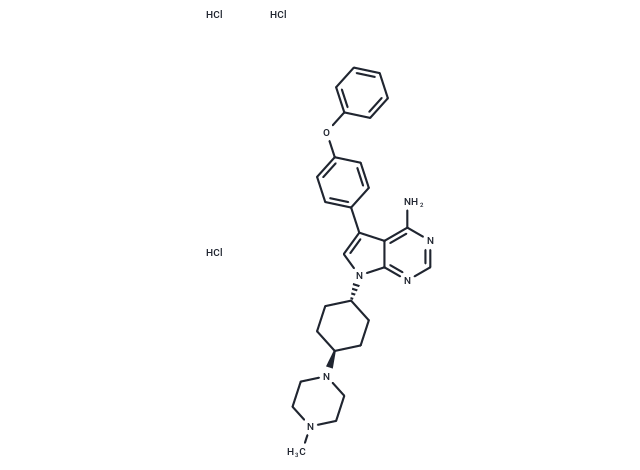Shopping Cart
- Remove All
 Your shopping cart is currently empty
Your shopping cart is currently empty

A 419259 trihydrochloride (RK 20449 trihydrochloride) is an Src family kinases inhibitor (IC50s: 9 nM, 3 nM and 3 nM for Src, Lck and Lyn).

| Pack Size | Price | Availability | Quantity |
|---|---|---|---|
| 1 mg | $48 | In Stock | |
| 2 mg | $68 | In Stock | |
| 5 mg | $109 | In Stock | |
| 10 mg | $179 | In Stock | |
| 25 mg | $335 | In Stock | |
| 50 mg | $587 | In Stock | |
| 100 mg | $839 | In Stock | |
| 500 mg | $1,670 | In Stock |
| Description | A 419259 trihydrochloride (RK 20449 trihydrochloride) is an Src family kinases inhibitor (IC50s: 9 nM, 3 nM and 3 nM for Src, Lck and Lyn). |
| Targets&IC50 | Src:9 nM, Lck:3 nM, Lyn:3 nM |
| In vitro | A-419259 inhibits K-562 cells (IC50: 0.1~0.3 μM), and Meg-01 proliferation (IC50: ~0.1 μM). A-419259 also potently induces apoptosis in K-562 cells beginning at 0.1 μM and increasing in a dose-dependent manner. PP2 inhibits Src kinase autophosphorylation in both Ph+ cell lines (K-562 and Meg-01) with an IC50 between 3 and 10 μM, while A-419259 blocks kinase activation between 0.1 and 0.3 μM. A-419259 strongly inhibits DAGM/Bcr-Abl cell proliferation in the absence of IL-3 (IC50: 0.1~0.3 μM) [1]. A-419259 inhibits overall SFK activity in K562 and other CML cell lines with an IC50 value of 0.1-0.3 μM [2]. |
| Kinase Assay | In vitro kinase assays are performed on His(6)-tagged Lck (residues 62-509) and full-length c-Abl purified from Sf-9 cells, and commercial sources of Lyn, Src and PKC. Lck, Lyn, Src and Abl activities are measured with an ELISA-based assay. Flat bottom 96-well ELISA plates are incubated with a 200 μg/mL solution of Poly(Glu, Tyr) 4 : 1 substrate in phosphate-buffered saline (PBS) for 1 h at 37°C and then washed with PBS containing 0.1% Tween-20 (PBS-T). Inhibitor dilutions are added to the washed plates already containing the appropriate enzyme in kinase assay buffer (250 mM Mopso, pH 6.75, 10 mM MgCl2, 2 mM MnCl2, 2.5 mM DTT, 0.02% BSA, 2 mM Na3VO4, 5% DMSO, 5 μM ATP). After incubation at room temperature for 20 min, plates are washed three times with PBS-T and plate-bound phosphotyrosine is detected with an anti-phosphotyrosine-HRP antibody conjugate and subsequent color development with K-Blue reagents [1]. |
| Cell Research | K-562 cells are grown in RPMI 1640 supplemented with 10% fetal calf serum (FCS), and 50 g/mL Gentamycin. Meg-01 cells are cultured in Vitacell modified RPMI 1640 (ATCC), supplemented with 10% FCS and 50 μg/mL Gentamycin. The human GM-CSF-dependent myeloid leukemia cell line TF-1 is grown in RPMI 1640 supplemented with 10% FCS, 50 μg/mL Gentamycin, and 1 ng/mL of recombinant human GM-CSF. DAGM murine myeloid leukemia cells are cultured in RPMI 1640 supplemented with 10% FCS, 50 μg/mL Gentamycin, and 0.5 ng/mL recombinant IL-3. Concentrated stock solutions of PP2 (5 mM) and A-419259 (2 mM) are prepared in DMSO and stored at -20°C. Cellular proliferation is measured using the Live/Dead growth assay. This assay employs calcein-AM, a fluorogenic esterase substrate that is taken up by viable cells and hydrolyzed intracellularly, releasing a green fluorescent product. Briefly, 10^4 cells are plated per well in 96-well plates for each day of a 4-day time course. Various concentrations of PP2, A-419259 or vehicle control are added to the wells (five wells per concentration per day) and the plates are incubated at 37°C. At each time point, one plate is centrifuged at 1500 g for 10 min to pellet the cells. Cells are washed with PBS, and calcein-AM is added to each well to a final concentration of 1 μM. Plates are incubated in the dark at room temperature for 1 h. The plates are then read at 485/530 nm (excitation/emission) using a fluorescent plate reader and data are analyzed with SoftMax Pro software [1]. |
| Alias | RK 20449 trihydrochloride |
| Molecular Weight | 592 |
| Formula | C29H37Cl3N6O |
| Cas No. | 1435934-25-0 |
| Smiles | Cl.Cl.Cl.CN1CCN(CC1)[C@H]1CC[C@@H](CC1)n1cc(-c2ccc(Oc3ccccc3)cc2)c2c(N)ncnc12 |
| Relative Density. | no data available |
| Storage | Powder: -20°C for 3 years | In solvent: -80°C for 1 year | Shipping with blue ice. | ||||||||||||||||||||||||||||||
| Solubility Information | H2O: ≥53 mg/mL (89.53 mM), Sonication is recommended. | ||||||||||||||||||||||||||||||
Solution Preparation Table | |||||||||||||||||||||||||||||||
H2O
| |||||||||||||||||||||||||||||||

Copyright © 2015-2025 TargetMol Chemicals Inc. All Rights Reserved.